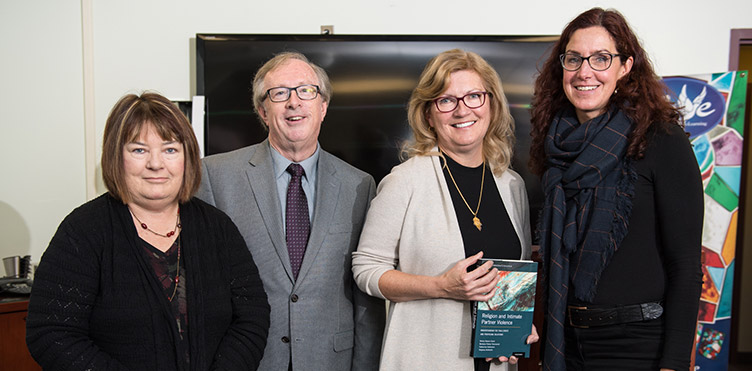MMFC research addresses a variety of contexts, subpopulations and forms of violence and abuse. These are explained below.
See our scholarly publications, reports, blogs, handouts and videos based on research results.
Women with disabilities face multiple structural barriers, thus increasing their risk of experiencing family violence. Perpetrators may include family members, intimate partners, and caregivers. Societies generally have policies for persons with disabilities; however, this does not necessarily ensure that public services are accessible or responsive to women with disabilities experiencing family violence.
The Violence against Women with Disabilities Research Team led by Dr. Angela Wisniewski, assistant professor in Science and Technology Studies at St. Thomas University, aims to better understand the lived experience of women with disabilities and the realities they face when confronting violence from intimate partners, other family members and paid caregivers. This team also investigates the challenges faced by service providers when helping this subpopulation of women; they have created a number of infographics and posters to raise awareness.
Family violence affects people of all genders, but it is gendered. Women are more likely to be victims/survivors, and men are more likely to be perpetrators. People who identify as 2SLGBTQ experience family violence at rates equal to or higher than cisgendered heterosexual people. Physical assault, sexual assault, and murder are crimes that occur in the context of family violence, a full understanding of which must include an analysis of their gendered nature.

Dr. David C. Hofmann, research fellow, is associate professor in the Department of Sociology at UNB.
David’s current research interests are focused on five broad areas:
Given the culture of toxic masculinity that often goes hand-in-hand with groups and individuals involved in right-winged extremist groups, the latter is an environment where IPV/gendered-violence is likely to thrive. David incorporates this relationship between right-wing extremism and IPV/gender-violence into his research.
Dr. Kelly Scott-Storey conducts research at the intersection of gender and health.
Safe and Understood: Intervening with families to promote healthy child outcomes and prevent abuse recurrence for young child victims of domestic violence exposure is a national project led in New Brunswick by Chantal Bourassa, professor at the School of Social Work, Université de Moncton. To date, two intervention programs have been implemented: Mothers in Mind, designed for mothers who have experienced intimate partner violence and their young children, and Caring Dads, designed for the fathers that have been violent in a family setting. This program aims to prevent the recurrence of violent acts, develop behaviours focused on the needs of the child, and promote a parental alliance with the other parent.

As a MMFC research fellow, Mayme Lafurgey (she/her/elle) is currently analyzing qualitative data on IPV in rural communities from the Canadian Domestic Homicide Prevention Initiative with Vulnerable Populations (CDHPIVP) national research project, in collaboration with Dr. Cathy Holtmann. Mayme is the Research Manager at CBDC Restigouche in Mi’gma’gi where she leads and collaborates on various national and regional qualitative and mixed-methods research projects. She is also an appointed member of the New Brunswick Women’s Council and serves as the Director of Research and Policy for the international non-profit organization, PINK Concussions.
Mayme’s work has largely focused on community-oriented and policy-driven approaches to research and methodologies that are grounded in postcolonial and intersectional feminist theoretical foundations. Recently, Mayme was a postdoctoral fellow at the MMFC and the Department of Sociology at the University of New Brunswick. Her work focused on increasing the accessibility of IPV services and supports in rural New Brunswick.
In addition to being a research fellow, Mayme is teaching the Intersecting Violences: Global Perspectives course, which is part of the Certificate in Family Violence Issues.
Family violence can have significant impacts on the physical and mental health of victims and perpetrators. Health care workers play an important role in responding to people's immediate physical and emotional needs, and with proper training, can determine if symptoms are the consequences of family violence. Thus, health practitioners are a crucial link between survivors/perpetrators and family violence resources in the community. In 2016, Canada's Chief Public Health Officer identified family violence as a public health concern.

Dr. Kelly Scott-Storey, a research fellow, is associate professor in the Faculty of Nursing at UNB. Her research addresses:
She has been part of an international team who have developed a short measurement instrument of intimate partner violence appropriate for use in national and population surveys. This instrument is currently being used by Statistics Canada in the new Gender-Based Violence Survey.
She is a co-principal investigator on iCAN Plan 4 Safety, a study that explores the effectiveness of an internet-based decision aid in enhancing safety behaviours, reducing exposure to violence and improving mental health among women; and iHeal, a study that aims to test the effectiveness of a complex, evidence-based health promotion intervention in enhancing mental and physical health, quality of life, capacities and resources of women who are in the process of separating from an abusive partner.
Dr. Petrea Taylor, research fellow, conducts research on gender, violence, and health, specifically the examination of health outcomes and behaviours in response to interpersonal violence. Following the completion of a PhD in Interdisciplinary Studies (IDST) in 2018, Dr. Taylor accepted a post-doctoral fellowship at UNB with supervisor Dr. Kelly Scott-Storey on the CIHR Men’s Violence, Gender, and Health Study (MVGHS) until January 2020 at which time she began a position as Assistant Professor with the UNB Faculty of Nursing. As an early career researcher, she is active in violence studies with mid- and senior-career researchers, including the following: co-investigator (co-I) on the MVGHS and co-I on two NBHRF bridge grants on men and cumulative lifetime violence (CLV), studies that we are expanding upon through proposal submissions for a CIHR operating grant, of which one I am a co-primary investigator (co-PI).
In addition, Dr. Taylor is the PI on a UNB funded research project in her specialty area, suicide, a health and social issue that implicates the study of mental health, violence, and interpersonal relationships. Past research projects examined suicide recovery and help-seeking behaviours. Dr. Petrea is also a clinical supervisor with the iHEAL project funded by the Public Health Agency of Canada, a nurse-lead primary health intervention RCT helping women who have left an abusive partner (co-PI Dr. Scott-Storey). This experience has awarded her vital knowledge and insights on women’s needs, barriers to seeking help, engagement of community partners, and an RCT evaluation of a domestic violence intervention.
Dr. Alexa Yakubovich's research program aims to advance a structural approach to understanding and preventing interpersonal violence and its health consequences, with a particular focus on IPV. This work includes both investigations of how structural factors impact burdens of IPV as well as the design, implementation, and evaluation of preventive interventions that account for these factors. Dr. Yakubovich conducts this work using a variety of research methods from the health and social sciences, including both quantitative and qualitative methods, often in collaboration with community, practice, and policy partners. She currently is leading a SSHRC-funded project evaluating housing interventions for women experiencing IPV and a mixed-methods evaluation of how the COVID-19 pandemic has impacted the violence against women sector. In addition, Dr. Yakubovich is collaborating on evaluations of structural interventions for women experiencing violence and analyses of structural risk factors for IPV and its health and social consequences.
Dr. Yakubovich is an Assistant Professor in Community Health and Epidemiology at Dalhousie University and a research fellow of the MMFC. She previously earned her PhD in Evidence-Based Social Intervention and Policy Evaluation at the University of Oxford as a Rhodes Scholar and completed a CIHR postdoctoral Fellowship at the University of Toronto and St. Michael’s Hospital.

Dr. Katie Aubrecht, research fellow, is a Canada Research Chair in Health Equity and Social Justice, and Associate Professor of Sociology at St. Francis Xavier University in Antigonish, Nova Scotia. Aubrecht’s action-oriented research program uses sociological theory, qualitative research methods and an intersectional analytical approach to analyze violence in health and social care services and supports in community, educational and residential care policies and practices. This program of work is supported by the Spatializing Care: Intersectional Disability Studies Lab, a transdisciplinary health and disability policy research and training infrastructure.
While we do not have evidence that immigrants are more or less likely to experience family violence than non-immigrants in Canada, they face multiple structural barriers: ethnicity/race, class and gender. These intersecting structures lead to unique vulnerabilities among immigrant survivors and perpetrators. With training, service providers can better respond to immigrants with diverse cultural and religious backgrounds. Atlantic Canada is experiencing rapid growth in its immigrant population. Governments should adapt their abuse protocols to better respond to the unique needs of immigrant women and children.
This Violence against Immigrant and Visible Minority Women Research Team, co-chaired by Dr. Catherine Holtmann, Associate Professor in the Sociology Department at UNB, and Natasha Akthar, of the New Brunswick Immigrant Women's Association, explores the nature, extent and impact of multiple forms of violence experienced by different groups of immigrant women within urban and rural New Brunswick. The research is used to develop practical resources to assist stakeholders in addressing issues of domestic and community violence within the different immigrant groups in New Brunswick.
An example is a film they developed in partnership with the Asian Heritage Society of New Brunswick, Breaking Barriers and Moving Forward, which highlights the struggles and successes of Asian women living in New Brunswick.
 Dr. Evangelia Tastsoglou, research fellow, is professor in the Department of Sociology and International Development Studies at Saint Mary's University. Evie is the principal investigator of several projects that explore violence against migrant and refugee women. Her research, published in national and international peer-reviewed venues, engages women, gender and various aspects of international migration; Canadian immigration and integration; violence, citizenship, transnationalism and diasporas.
Dr. Evangelia Tastsoglou, research fellow, is professor in the Department of Sociology and International Development Studies at Saint Mary's University. Evie is the principal investigator of several projects that explore violence against migrant and refugee women. Her research, published in national and international peer-reviewed venues, engages women, gender and various aspects of international migration; Canadian immigration and integration; violence, citizenship, transnationalism and diasporas.
Only a small proportion of family violence incidents are reported to police – the front line of the legal system’s response to family violence. Other components of the legal system’s response include civil and criminal courts, victim services, prisons, probation, and treatment programs. Each of these components include laws and procedures as well as the professionals who enforce them. Research plays a role in assessing how effective the system and justice professionals are in ensuring justice for victims and holding perpetrators accountable for their actions. Sometimes changes to the legal system’s response to family violence have unintended consequences.
 Dr. Mary Ann Campbell, research fellow, is professor in the Department of Psychology on the Saint John campus of UNB and the Director of the Centre for Criminal Justice Studies. Her research focuses on developing and enhancing the application of evidence-based strategies for crime prevention and reduction as well as police psychology. In collaboration with the New Brunswick Department of Public Safety, Mary Ann's research team is working on a study to extend the predictive validity of the ODARA (Ontario Domestic Assault Risk Assessment) to a wider population of perpetrators (females, Indigenous persons, immigrants).
Dr. Mary Ann Campbell, research fellow, is professor in the Department of Psychology on the Saint John campus of UNB and the Director of the Centre for Criminal Justice Studies. Her research focuses on developing and enhancing the application of evidence-based strategies for crime prevention and reduction as well as police psychology. In collaboration with the New Brunswick Department of Public Safety, Mary Ann's research team is working on a study to extend the predictive validity of the ODARA (Ontario Domestic Assault Risk Assessment) to a wider population of perpetrators (females, Indigenous persons, immigrants).
 Dr. Linda Neilson, research fellow, is professor emerita at UNB. Linda is a recognized academic authority on legal systems and domestic violence, as well as the impact of exposure to family violence on children. She serves regularly as academic advisor on domestic violence and court-related, cross-sector government committees. She is the author of the e-book, Responding to Domestic Violence in Family Law, Civil Protection and Child Protection Cases, published by the Canadian Legal Information Institute. She co-authored a report titled Interpreting the New Divorce Act, Rules of Statutory Interpretation and Senate Observations which is featured on the FREDA Centre for Research on Violence Against Women and Children website. She was the principal investigator of a research project on a Coordinated Provincial/Queen's Bench Family Violence Court Model. Final Report: EN | FR
Dr. Linda Neilson, research fellow, is professor emerita at UNB. Linda is a recognized academic authority on legal systems and domestic violence, as well as the impact of exposure to family violence on children. She serves regularly as academic advisor on domestic violence and court-related, cross-sector government committees. She is the author of the e-book, Responding to Domestic Violence in Family Law, Civil Protection and Child Protection Cases, published by the Canadian Legal Information Institute. She co-authored a report titled Interpreting the New Divorce Act, Rules of Statutory Interpretation and Senate Observations which is featured on the FREDA Centre for Research on Violence Against Women and Children website. She was the principal investigator of a research project on a Coordinated Provincial/Queen's Bench Family Violence Court Model. Final Report: EN | FR
Linda heads a network of international legal scholars working on the issue of parental alienation, a highly problematic concept used in family law. She submitted a memo to the World Health Organization (WHO), along with the support of many others from Canada, Australia, France, Israel, Italy, New Zealand, Spain, Switzerland, United Kingdom, and the United States, to remove all references to “parental alienation” and related concepts from the WHO’s International Classification of Diseases 11th Revision (ICD-11).
 Dr. Karla O’Regan, research fellow, is associate professor in Criminology at St. Thomas University and part-time lecturer at UNB’s Faculty of Law. Her research focuses on consent laws and the socio-legal contexts of sexual violence.
Dr. Karla O’Regan, research fellow, is associate professor in Criminology at St. Thomas University and part-time lecturer at UNB’s Faculty of Law. Her research focuses on consent laws and the socio-legal contexts of sexual violence.
She works with the Fredericton Sexual Assault Centre, the Fredericton Police Force, and the New Brunswick Department of Justice. Her book, Law & Consent: Contesting the Common Sense, is available through Routledge Publishing.

Mary Aspinall, research fellow, is an Assistant Professor in the Department of Criminology and Criminal Justice at St. Thomas University. Mary's research interests focus on the implementation of intimate partner violence treatment programs and specialized domestic violence courts throughout Canada. Mary has also worked with national research teams, concentrating on domestic homicide as well as coercive control and the criminal justice response.
Religion is a social institution that influences gender roles and families. Religion is not the cause of family violence but rather shapes it along with the culture in which religious individuals and families are embedded. Religious texts and practices can be used by perpetrators to justify family violence however, there are resources in every religious tradition that can be harnessed to ensure the safety of women and children. The religious landscape in Canada is becoming increasingly diverse. In a multicultural society which values religious freedom, service providers should get training in order to become more sensitive to the unique needs of religious survivors and perpetrators.

The Religion and Violence Research Team, led by Dr. Catherine Holtmann and Dr. Stephen McMullin, Academic Dean at Acadia Divinity College, examines the story of what happens when religious people look to their faith communities for help in the aftermath of violence in the family context. Members of the team have conducted studies with religious leaders, seminarians, women of faith, men who batter, congregations, shelter workers, advocates, criminal justice personnel, facilitators of faith-based treatment programs and therapeutic professionals.
This research forms the basis of online resources available on the Religion and Violence E-Learning or RAVE website and contributes to filling in the missing pieces of the puzzle regarding how best to combat family violence in families of faith.
The #MeToo movement has heightened public attention to the widespread problem of sexual violence in society. Feminist researchers argue that we live in a “rape culture” in which normative heterosexual scripts foster sexual assault of women, children and minority persons. The process of consent is at best obscured. Technology has facilitated cyberviolence which includes harassment, the non-consensual sharing of intimate images and the distribution of images of child sexual abuse. Sexual violence research can inform practice and policy in education, health care, and religious institutions.

The Sexual Violence Research Team's objective is to build a more textured account of the presence of sexual violence and intimate partner sexual violence in the lives of New Brunswick women and create space for marginalized voices in particular.
The team, led by Lorraine Whalley of Sexual Violence New Brunswick (formerly the Fredericton Sexual Assault Centre), is committed to projects that involve collaboration with varied community stakeholders and implementation of action-oriented approaches with the goal of contributing to community mobilization efforts in the prevention of sexual violence, as well as practice and policy innovation. Members of the Sexual Violence Research Team contributed to the New Brunswick Sexual Violence Framework and serve on its implementation committee.
 Dr. Diane Crocker, research fellow, is professor and chair of the Department of Criminology at Saint Mary's University.
Dr. Diane Crocker, research fellow, is professor and chair of the Department of Criminology at Saint Mary's University.
Her research interests include restorative justice, rape culture, violence against women, criminal harassment, and the use of law to address social problems, especially those that affect women.
Diane uses participative narrative inquiry (PNI) as a method to promote cultural change.

Dr. Lucia F. O’Sullivan, research fellow, is professor in the Department of Psychology at UNB and the director of the experimental psychology program.
Her research addresses the interface of sexuality and intimate relationships, with a primary focus on adolescents and young adults including:

Kim Dubé, research fellow, is a professor in the Department of Sociology and Criminology at the University of Moncton. Her current research interests focus on sexual violence among university athletes in the Atlantic provinces, the representation of sexual violence in Canadian media, and the trajectories of older women experiencing intimate partner violence. Her research and advocacy are anchored in an intersectional feminist approach. An activist at heart, she is an advocate for reproductive justice, 2LGBTQIA+ and BIPOC folks' rights, and gender equality.
Family violence impacts people from the womb to the grave – it discriminates against no one. While young adults are at a higher risk of experiencing intimate partner violence than any other age group, intervention and prevention efforts are necessary at all stages of the lifespan. Awareness-raising and education campaigns should consider the learning styles and specific needs of people of different ages.
Preventing and Eliminating Cyberviolence against Young Women and Girls is a project that was initiated by the MMFC in collaboration with the New Brunswick Association of Social Workers and the New Brunswick Office of the Child and Youth Advocate. The team worked with young identifying women between the ages of 16 and 19 to identify institutional responses to cyberviolence and the lived experiences of cyberviolence in New Brunswick. Dr. Matt Rogers, associate professor with the Faculty of Education at UNB, has led the recent production of a participatory video drama, Social Proof, based on themes of the earlier research. The team’s intention was to mobilize the voices of young women and to use an arts-based approach to accent youth agency and address institutionalized paternalism.
The goal of the Creating Peaceful Learning Environments Research Team is to assist schools to reduce violence across the lifespan and to enhance resiliency, therefore contributing to the creation of a peaceful learning environment for all. The team is led by Dr. Ann Cameron, professor emerita, UNB and honorary professor at UBC.
Gender factors in:
This works highlights the importance of gender and culturally sensitive research analyses and interventions. Significant implications for school’s violence prevention, social and emotional development and youth resiliency work arose from this research.

The Abuse and Neglect of Older Adults Research Team (ANOART) seeks to understand Maritime adults’ experience with violence later in life, with a focus on the abuse and neglect of older women. The team, co-chaired by Dr. Lori Weeks, associate professor at Dalhousie University's School of Nursing, and Danie Gagnon, has investigated the gaps, challenges and importance of having a gendered community response to respond and prevent violence of older adults as women are more at risk of being abused. This research contributes to meeting the needs of older women who are visible minorities, official language minorities or living in a rural area.
Many of us spend more time at work than in our homes, yet family dynamics have an impact on relationships in the workplace. The inverse is also true – workplaces can be a breeding ground for bullying and harassment that impact employees' physical and emotional wellbeing. Workplaces can be environments in which victims suffer in silence or get the information and support to assist them in making their lives safer and healthier. Employers can access resources for information and training in order to ensure that their work environments support healthy relationships. New Brunswick, along with other provinces in Canada, has amended its Employment Standards Act to include paid and unpaid leave for intimate partner, domestic, and sexual violence.
The Workplace Violence and Abuse Research Team (WVAT) conducts and disseminates research designed to deepen our understanding of the various ways in which New Brunswickers experience bullying, intimidation, harassment, victimization, aggression, and other forms of violence and abuse in their workplaces. The Team is co-chaired by Nicole Smith, owner of Nicole Smith Conflict Management and Shelley Parker, Instructor of Psychology at UNB and Industrial Psychologist at NB Power. Team members include Lindsay Manuel, Senior Program Advisor of Violence Prevention and Community Partnerships for the Executive Council Office, Brenda Moore, Learning Advisor for the Department of Defence, Angela Leger, Conflict Management Practitioner and Community Representative, Bronwen Cunningham, Senior Policy Analyst of Policy, Research and Labour Market Analysis for the Department of Post-Secondary Education, Training and Labour, Debra Ward, Interim Human Rights Officer at UNB and Sheila Burt, the former Acting Associate Director of the Muriel McQueen Ferguson Centre. The results of the Team’s research have formed the basis of the Towards a Respectful Workplace website at Michigan State University. The Team organizes and hosts Respectful Workplace Week annually in the first week of September.
The MMFC is also a founding member of the New Brunswick Family Violence and the Workplace Committee which has developed online resources for employers and employees. The Workplace Toolkit, "Family Violence: It's Your Business," was a first of its kind in Canada, and was designed to provide employers, unions and employees with information and resources to recognize and respond to family violence situations that entered the workplace. The Committee provides training, resources and tools to employers across New Brunswick in English and French.

Dr. Laura Winters, research fellow, is the Executive Director of the St. John's Status of Women Council and Women's Centre, a feminist organization that does direct service provision and public advocacy work around gender equality in St. John's, Newfoundland. She is a sociologist and adjunct professor in the Gender and Women's Studies Department at Memorial University of Newfoundland. Laura researches stigma resistance, especially in the everyday "talk back" of people who do sex work and believes there is a need to think critically about research ethics in the context of research as advocacy with marginalized populations. Laura currently oversees the DV@WorkNL research, a provincial project developed to address the need for more knowledge about the impacts of domestic violence on workers and workplaces and to increase the capacity of employers and unions to develop policies and resources.